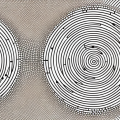Deductive reasoning puzzles combine logic and problem solving to challenge your ability to draw conclusions from a set of given facts. Deductive reasoning puzzles are incredibly popular and the rules are simple: you must use logic and deduction to work out the solution to the puzzle. In this guide, we’ll cover the basics of how to solve deductive reasoning puzzles, as well as helpful tips and strategies, examples of puzzles, common mistakes people make, and what you can do to further develop your skills for solving deductive reasoning puzzles.
What Are Deductive Reasoning Puzzles?
Deductive reasoning puzzles challenge you to use your logic skills to draw conclusions from a set of facts or conditions given in the puzzle. The goal is to determine what the hidden answer is by the end. Every puzzle has a unique solution, and the challenge comes from understanding the clues given and analyzing them to find the answer. Deductive reasoning puzzles can range from easy to complex and vary in their difficulty levels depending on the number of clues or pieces of information given.
Breaking Down the Basics of Deductive Reasoning
The concept of deductive reasoning is based on the theory that if something is true, any statement derived from it must also be true. In other words, if you have a series of facts, you use these facts to draw logical conclusions that lead to an answer or solution. Deductive reasoning is a process of using logical steps and assumptions to move from a general statement to a specific conclusion. It’s this process that allows you to solve deductive reasoning puzzles.
Understanding How to Solve Deductive Reasoning Puzzles
When you begin a deductive reasoning puzzle, it’s essential that you first look at all of the pieces of information you have been given. Read them carefully, then start by asking yourself what conclusion can be drawn from the facts or clues presented in the puzzle. As you answer this question, you can then piece together the solution by connecting all of the facts.
Tips and Strategies for Solving Deductive Reasoning Puzzles
When solving a deductive reasoning puzzle, there are a few tips and strategies that can help you come to a solution. Start by taking your time and reading each of the clues or pieces of information carefully. Then, look for any patterns or relationships between the clues that can help you determine what each clue means. Once you have all the pieces of the puzzle together, break them down into individual questions and work through them one at a time. Finally, keep in mind that each clue and statement is essential for deriving a logical conclusion.
Examples of Deductive Reasoning Puzzles
There are many different types of deductive reasoning puzzles and no two are quite alike. One popular example is a cipher wheel – one of the oldest forms of puzzles that involve using a wheel with a sequence of letters or symbols to decipher coded messages. Another example is a logic grid puzzle, where you must fill in a series of squares with different numbers or symbols in order to create a logical conclusion or answer.
Common Mistakes When Solving Deductive Reasoning Puzzles
When solving deductive reasoning puzzles, it’s easy to overlook important pieces of information or draw the wrong conclusion from facts given in the puzzle. Common mistakes people make include not reading each clue carefully enough or forgetting to consider all the relationships between clues. Other mistakes include making assumptions that aren’t supported by given facts or jumping to conclusions too quickly.
How to Develop Your Deductive Reasoning Skills
Deductive reasoning is an invaluable skill that can be developed over time through practice and dedication. One way to start honing your deductive reasoning skills is to find good quality puzzles to work on, such as those from popular puzzle books or websites. You can also practice solving puzzles with friends and family in order to get feedback on your progress. Additionally, playing strategy games such as chess or Scrabble can help improve your ability to think logically and make deductions.
Resources for Improving Your Skills in Solving Deductive Reasoning Puzzles
If you want to develop your deductive reasoning skills further, there are numerous resources available online. Puzzle books such as “The Logician’s Handbook” offer wide ranges of puzzles with different levels of difficulty and instructions on how to solve them. Additionally, websites such as Top Puzzles feature an extensive selection of logic puzzles with detailed explanations and solutions. Finally, there are also computer games designed specifically for developing deductive reasoning skills such as “The Logic Game” or “Deductive Logic And Strategy.”
Deductive reasoning puzzles are fun and challenging ways to develop logical thinking skills. Through practice and determination, anyone can improve their ability to solve these types of puzzles. With this guide, we hope that you now have a better understanding of how they work and what it takes to master this thought-provoking challenge.





